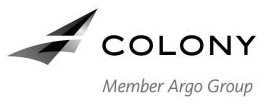COLONY Confusingly Similar to COLONY MEMBER ARGO GROUP & DESIGN, Says TTAB, Affirmingly
In another enervating clash of insurance company marks, the Board affirmed a Section 2(d) refusal of COLONY for "life insurance underwriting" on the ground of likely confusion with the registered mark COLONY MEMBER ARGO GROUP & Design for "insurance services, namely, writing commercial excess and surplus insurance" [GROUP disclaimed]. Despite Applicant Genworth Financial's vigorous arguments, the Board found that none of the relevant du Pont factors favored Applicant. In re Genworth Financial, Inc., Serial No. 77782734 (August 29, 2012) [not precedential].

The Board deemed the marks to be similar in appearance, sound, connotation, and commercial impression. In short, Applicant appropriated the dominant portion of registrant’s mark. The less prominent wording "Member Argo Group" in the cited mark merely explains the corporate identity of the registrant. Genworth argued that the "sail" design reinforces the ARGO GROUP house mark, since "ARGO"’ is "a well-known reference to the ship in which Jason sailed in quest of the Golden Fleece in Classical Mythology," but the Board refused to climb on board.
Arguing that COLONY is a weak formative, Genworth submitted five registrations in class 36 for marks that include the word COLONY, but none covered insurance services and the record was devoid of evidence of the nature and extent of use of the marks.
The Board concluded that consumers may believe that the mark COLONY is a shortened form of the cited mark.
As to the services, Examining Attorney Katherine C. Weigel proffered two third-party registrations covering both "life insurance and excess and surplus insurance," and Internet evidence showing seven companies offering both services. As to the Internet evidence, Genworth argued that the PTO's position "is akin to arguing that chewing gum and razor blades are similar or related products simply because grocery stores may offer both products." The Board was not moved: the fact that the involved services may be offered in different sections of the websites does not mean that the services are unrelated. "It is not uncommon for users to navigate a website by using links or tabs, which suggests that prospective consumers would be familiar with this arrangement and not consider any of the single websites necessarily akin to a grocery store."
The Board noted that that there are no restrictions in the recitation of services in the involved application and registration, and so it must consider that Applicant and Registrant "each can market its insurance services through direct sales as well as through agents, and that these related services can be offered to the same consumers." And don't forget that even sophisticated consumers are not immune to source confusion.
The lack of proof regarding actual confusion was entitled to little weight, since there was no evidence regarding the extent of use of applicant’s and registrant’s marks, or whether there have been meaningful opportunities for confusion to occur.
Balancing the relevant du Pont factors, the Board found confusion likely, and it affirmed the refusal to register.
Text Copyright John L. Welch 2012.




0 Comments:
Post a Comment
<< Home